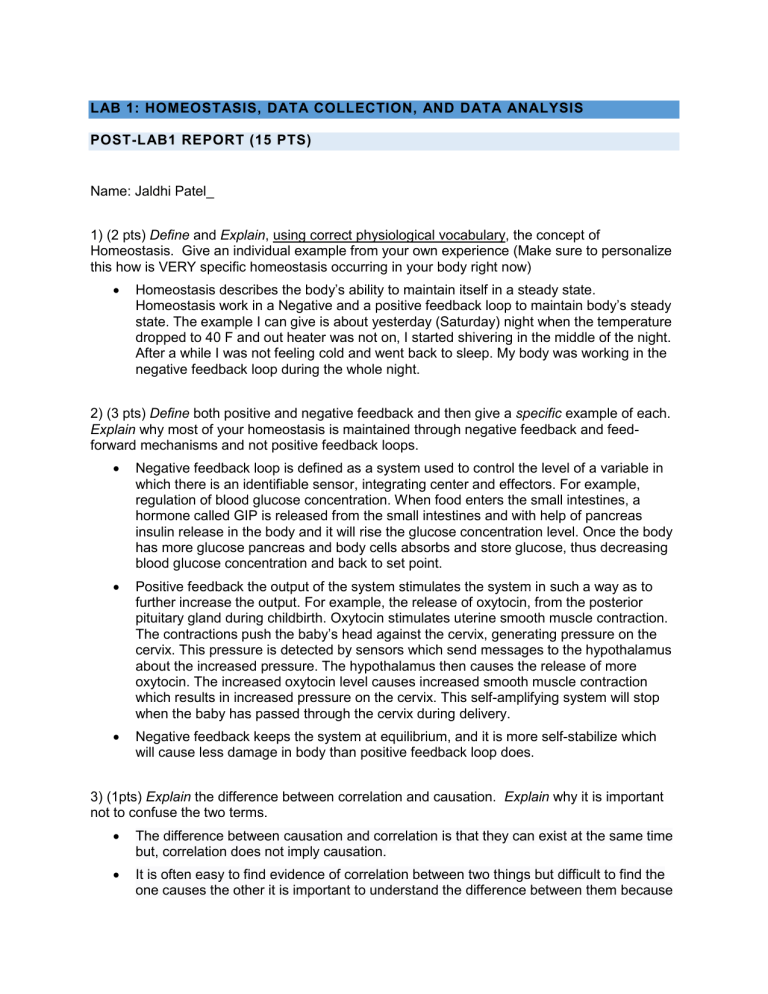
LAB 1: HOMEOSTASIS, DATA COLLECTION, AND DATA ANALYSIS POST-LAB1 REPORT (15 PTS) Name: Jaldhi Patel_ 1) (2 pts) Define and Explain, using correct physiological vocabulary, the concept of Homeostasis. Give an individual example from your own experience (Make sure to personalize this how is VERY specific homeostasis occurring in your body right now) Homeostasis describes the body’s ability to maintain itself in a steady state. Homeostasis work in a Negative and a positive feedback loop to maintain body’s steady state. The example I can give is about yesterday (Saturday) night when the temperature dropped to 40 F and out heater was not on, I started shivering in the middle of the night. After a while I was not feeling cold and went back to sleep. My body was working in the negative feedback loop during the whole night. 2) (3 pts) Define both positive and negative feedback and then give a specific example of each. Explain why most of your homeostasis is maintained through negative feedback and feedforward mechanisms and not positive feedback loops. Negative feedback loop is defined as a system used to control the level of a variable in which there is an identifiable sensor, integrating center and effectors. For example, regulation of blood glucose concentration. When food enters the small intestines, a hormone called GIP is released from the small intestines and with help of pancreas insulin release in the body and it will rise the glucose concentration level. Once the body has more glucose pancreas and body cells absorbs and store glucose, thus decreasing blood glucose concentration and back to set point. Positive feedback the output of the system stimulates the system in such a way as to further increase the output. For example, the release of oxytocin, from the posterior pituitary gland during childbirth. Oxytocin stimulates uterine smooth muscle contraction. The contractions push the baby’s head against the cervix, generating pressure on the cervix. This pressure is detected by sensors which send messages to the hypothalamus about the increased pressure. The hypothalamus then causes the release of more oxytocin. The increased oxytocin level causes increased smooth muscle contraction which results in increased pressure on the cervix. This self-amplifying system will stop when the baby has passed through the cervix during delivery. Negative feedback keeps the system at equilibrium, and it is more self-stabilize which will cause less damage in body than positive feedback loop does. 3) (1pts) Explain the difference between correlation and causation. Explain why it is important not to confuse the two terms. The difference between causation and correlation is that they can exist at the same time but, correlation does not imply causation. It is often easy to find evidence of correlation between two things but difficult to find the one causes the other it is important to understand the difference between them because correlation is not the same as a causation, sometimes two things can share a relationship without causing the other. 4) (3 pts) Hyperlink your news story here and write a short paragraph explaining what about this story demonstrates fallacious reasoning (be specific about what kind of fallacious tactics are used there) and what you would do to change it. In this paragraph, please comment on the fact that this fallacy was found in your “trusted” news source. https://www.foxnews.com/politics/media-erupt-over-trump-comments-on-disinfectantheres-what-he-said In this article it say, ”study that suggested increased heat, light and humidity in the summer could decrease the time it takes for the coronavirus to disperse on surfaces and in the air, and potentially slow the spread of the disease during the warmer months.” It is Appeal to Authority type of fallacy. I think this is a fallacious reasoning because there is no proof of heat destroying the virus, if it were true then the places where they go through extreme heat in summer would have less covid cases due to decreasing effect on surface. Then there was no point of washing hands because it will not spread through surface which is not true. 5) (1 pts) List and explain three systems/events/feedback loops in your physiology that have circadian variation. Sleep wake cycle Digestive system Body temperature 6) (5 pts) Keep track of your sleep wake cycle for 3 consecutive days (or longer). Record the total length of sleep for each day. Graph this data – making sure to use correct independent and dependent variables. Then write about your data. Is this sleep “enough” for you and how would you know what is “enough”? How would you say you compared to other physiology students? What can you do to increase your amount of good quality sleep during this semester? number of hours sleep wake cycle 10 9 8 7 6 5 4 3 2 1 0 Ряд1 Ряд2 Day 1 Day 2 Day 3 Number of days Independent variable: days Dependent variable: hours Blue: hours of sleep Orange: awaken time I think I had enough sleep for the day. 8-9 hours of sleep is an average sleep human body needs in a day. I am not sure how other students’ sleep cycle is but I am satisfied with mine. I always needed a good enough sleep to function the next day, so I usually plan my sleep cycle beforehand. Reference: https://slcc.instructure.com/courses/654598/pages/lab-1-pre-lab-reading2?module_item_id=14616842


